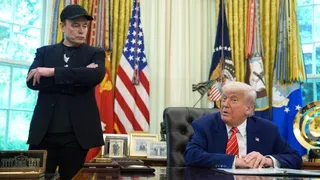March 15, 2012
Toyota's New Diversity Director Spotlights LGBT Employees
Winnie McCroy READ TIME: 3 MIN.
An elite group of New York's LGBT community leaders gathered at Toyota Motor's North American office on Lexington Avenue on the evening of March 8 to welcome Stephen Lewis, TFS's new director of diversity and inclusion. Also present was Kathryn Friedman, director of the Human Rights Campaign's Workplace Project, who celebrated Toyota's 2012 100 percent HRC Corporate Equality Index (CEI) rating.
"We at Toyota are proud of our HRC rating and we are one of only three automakers to have achieved 100 percent," Lewis pointed out in his remarks to the crowd. Toyota has become one of the very few top Fortune 500 companies to put transgender benefits into place.
HRC's coveted 100 percent CEI requires companies to go far beyond offering employees "diversity groups," or providing same-sex partner insurance benefits. Among those amenities Toyota provides its employees are transgender-inclusive health care that explicitly affirms coverage with no blanket exclusion, with a dollar maximum that must meet or exceed $75,000. This is based on the standards of WPATH, the World Professional Association for Transgender Health.
With New York City's glittering skyline as the backdrop, HRC's Friedman welcomed Lewis to his new post at Toyota. "The corporate equality index is a very critical survey tool because it helps create equity for LGBT people where our legislative process is moving very slowly," said Friedman. "As corporations meet the criteria for a 100 percent CEI, it broadens equal rights. And because these criteria have lots of different components, it also becomes an educational vehicle for the whole corporation to become more culturally competent.
"It then spreads out to our community as a whole. For fair-minded Americans, it starts to open up the question of 'Why shouldn't there be equal rights for LGBT people?'"
Corporations, in fact, have become key players in forwarding gay rights. In Washington State, their support was key to the recent passage of marriage equality. This is partly because of ethical concerns -- but undoubtedly, these companies are realizing that such support also makes business sense.
"Other people in the car industry start looking at that, see the press it gets and the talent it pulls," said Friedman. "People in all different industries want to have the label as the best places to work for LGBT employees, and as both supplier-facing and customer-facing, because it becomes so important for hiring, retention, and recruitment."
Only Ford and Chrysler also have achieved 100 percent ratings among car manufacturers; Subaru lacks only one criteria.
"Having Stephen Lewis join the Diversity and Inclusion Team as an out LGBT person speaks volumes to LGBT people at Toyota that you can be successful in your career, be a leader, and that LGBT people are not going to be forgotten at your company," said Friedman.
This sentiment was echoed by New York's LGBT Community Center executive director, Glennda Testone: "It is so important for companies to stand up for equality of LGBT people, and working towards that 100 percent on the HRC index is one way to do that."
The head of Gay Men's Health Crisis, the largest private AIDS social-service agency in the world, echoed that sentiment. "Diversity is the cornerstone of success in life, public health, and business," Dr. Marjorie Hill said. "Many companies would do well in diversity but for their lack of inclusion of transgender people. So Toyota hit the ball out of the park with its perfect score."
Many in attendance also remarked on Lewis' genial personality. "I really enjoyed meeting Stephen Lewis," said Testone. "He had been to the Center and knew all about what we do to help the community. We look forward to partnering with him in the future."
As for Lewis, he believes that "diversity is an essential element for Toyota. One thing that keeps Toyota ahead of the pack is we view diversity as a strategic priority that goes beyond HR policy and educational programs. When we make diversity an integral part of who we are and how we naturally think, we will gain the insights to grow our business and become an even more successful and integrated member of the community."
For more information on how well (or how badly) large corporations do regarding gay rights, visit HRC's Corporate Equality Index.
Winnie McCroy is the Women on the EDGE Editor, HIV/Health Editor, and Assistant Entertainment Editor for EDGE Media Network, handling all women's news, HIV health stories and theater reviews throughout the U.S. She has contributed to other publications, including The Village Voice, Gay City News, Chelsea Now and The Advocate, and lives in Brooklyn, New York.






